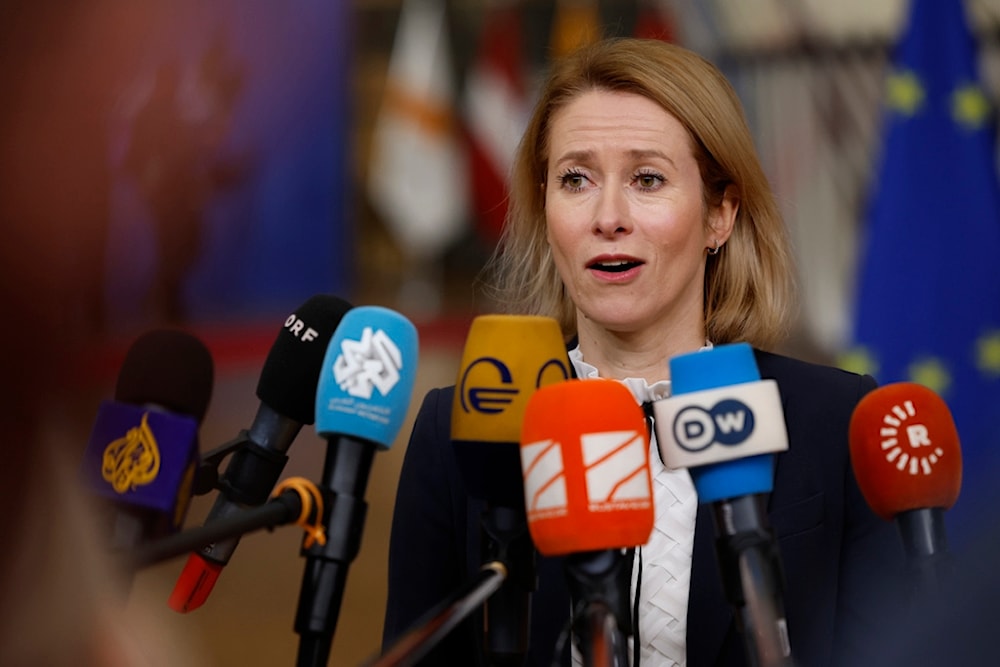Syria shows that Russia not invincible: EU top diplomat
EU top diplomat Kaja Kallas and other EU leaders welcomed the fall of the Assad government as "a positive development" for Syria.
-

European Union foreign policy chief Kaja Kallas speaks with the media as she arrives for an EU summit at the European Council building in Brussels, Thursday, Dec. 19, 2024. (AP)
The European Union's top diplomat, Kaja Kallas, stated on Thursday that Russia is not invincible and urged Europe to recognize its own strength. Speaking ahead of the European Council summit in Brussels, Kallas pointed to Syria as evidence of Russia's limitations.
"Syria shows that Russia is not invincible. We should not underestimate our own power," Kallas told reporters.
Her comments come in the wake of the December 8 collapse of the former Syrian government led by Bashar Assad. After a 13-year war, opposition groups succeeded in toppling the Assad government, marking a significant shift in the region's political landscape.
The EU leaders' summit focused on two key issues: ongoing support for Ukraine and Europe's role in the global order. Kallas stressed the need for European unity to maintain influence on the world stage.
"Everyone is looking at us in these developments that are going on in the world," she said. "We see struggles between forces that want to have a world order where 'might makes right,' and then the EU, where we want to have a world that is rules-based and … where those who have the powers cannot just take what they want."
Kallas and other EU leaders welcomed the fall of the Assad government as "a positive development" for Syria. She further commented, "It also shows the weakness of Assad's backers, Russia and Iran."
Following an EU foreign ministers' meeting earlier in the week, Kallas announced that the bloc would explore options to work with Syria's new leadership, including efforts to close Russian military bases in the country.
Read more: EU to reevaluate Syria policy following Assad's exit
Hayat Tahrir al-Sham (HTS), a former al-Qaeda affiliate, is designated as a terrorist organization by both the EU and the US.
Western media reports suggest that the group is attempting to rebrand itself with a more "moderate" image since taking control in Syria. Critics, however, remain skeptical, pointing to concerns about its ideological roots, governance practices, and treatment of minorities under its rule.
Russia must exit Syria for EU to lift sanctions on HTS
On December 16, Dutch Foreign Minister Caspar Veldkamp called for Russia's military withdrawal from Syria as a key condition for lifting EU sanctions on HTS.
Speaking ahead of an EU foreign ministers meeting, Veldkamp stressed the need to tie sanctions relief to an inclusive political transition and the removal of Russian forces.
"I think it's too early to lift those sanctions," Veldkamp said. "We really would like to condition that on an inclusive political transition."
He added, "It's also important to look at conditionality regarding the Russian military bases in Syria. We want the Russians out."
Read more: Debate rises over sanctions as Syria faces urgent humanitarian crisis
Veldkamp stressed that HTS must respect minority rights, including those of Christians and Kurds, and avoid agreements that allow Russia to maintain its military presence in the country.
Previous reports from Bloomberg indicate that Moscow is negotiating an agreement with Syria’s new leadership to retain control of two strategic bases: the naval port in Tartus and the airbase at Khmeimim.
"I think it’s also important to look at conditionality regarding the Russian military bases in Syria," Veldkamp said. "We want the Russians out."

 4 Min Read
4 Min Read








